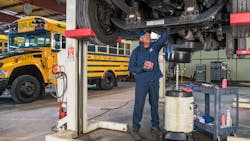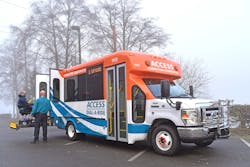Whether due to increased emissions regulations or to meet sustainability goals, many fleets are looking for ways to lower their carbon footprint. While electric vehicles are one of the most-discussed ways to do so, the technology is still in development and come with a range of obstacles that fleets are working to surmount, including range concerns and infrastructure development. Alternative fuels such as propane autogas offer an alternative with several benefits over electric vehicles for fleets both in the shop and on the road.
Propane owes its origins to the Ford Model T and the scientific curiosity and acumen of a chemist named Dr. Walter Snelling. He developed a propane fuel for transportation called Autogas 110 years ago, commonly known as liquefied petroleum gas (LPG), after investigating a leak in a Ford Model T gas tank.
Read more: More fleets finding alt-fuel success with propaneToday, ROUSH CleanTech, a provider of propane powertrain solutions, has built on Snelling's invention and uses a Ford light- and medium-duty chassis as the base for its propane fuel conversion system, with the company's engines certified to 0.02 grams of NOx per brake horsepower-hour.
According to the non-profit Propane Education & Research Council, light-duty vehicles using Autogas produce 36% fewer NOx emissions than diesel and 5% less than gasoline. For medium-duty, propane fuel generates 4% less NOx and 12% fewer greenhouse gases than diesel. PERC has also reported that on average in the U.S., propane emits 52% fewer GHGs than grid-generated electricity.
There are also several maintenance-based reasons for fleets to consider propane, explained Todd Mouw, executive vice president of sales, marketing & customer success at ROUSH CleanTech.
1. Cost savings
One of propane's benefits over diesel is the cost savings generated by not needing to maintain or repair aftertreatment systems, nor do fleets need to purchase diesel exhaust fluid.
A maintenance team will still need to follow Ford's recommended intervals for oil changes and spark plugs, Mouw noted. He drives a propane-powered cargo van, and said at the 10,000-mile oil change, the drained oil looks “like you just poured it.”
But propane does make fleets eligible for per gallon tax credits, according to the U.S. Department of Energy, as propane generates fewer emissions than conventional fossil fuels. Because of this, fleets can take advantage of the Alternative Fuel Excise Tax Credit of $0.50 per gasoline gallon equivalent for propane. The tax credit was extended through 2024.
“The TCO [Total Cost of Ownership] benefit to it is really unparalleled,” Mouw said. “Depending on the miles fleets run, they are saving anywhere from 25 up to 40 cents a mile,” Mouw said.
Kitsap Transit, the government agency transporting people around Kitsap County, Washington, has over 180 vehicles, including more than 50 buses and Ford E-450s using Roush’s propane conversion system. According to Dennis Griffey, Kitsap’s director of fleet and facilities, the propane-powered Fords cost $0.30 less per mile than diesel counterparts. He said fuel and maintenance cost $0.20 each per mile this summer, while diesel was $0.35 per mile.
“I haven't had any real maintenance on those buses over the last year,” Griffey said. “They're very cost effective. The downtime on them is so insignificant compared to the (General Motors diesel) Duramax engines that we have that it's not even comparable.”
Swapping out a propane pump might take two hours, he noted, while they change out head gaskets at 120,000 miles. Spark plugs are replaced at 20,000 miles. And the first propane vehicles delivered in 2015 are just now getting fuel injectors swapped, even with the transit vehicles driving 22,000 miles annually.
Griffey said in general that newer spark plugs help the engine run more efficiently and at a lower temperature.
“We've noticed that fleets that run extremely long spark plug changes change head gaskets much more frequently than we do, or have much more problems with them,” he added.
Kitsap has changed out 11 head gaskets and lost 10 coils on the propane units since 2015 as well.
2. Technician recruiting and retention
Propane can also offer benefits for technician recruiting and retention, and not only because working on a propane powertrain versus diesel means eschewing any and all aftertreatment issues. As they are similar to gas engines, a fleet can draw new hires from both truck and auto technician pools.
Kitsap has both, and it’s apparent which engines the technicians prefer to work on.
“They fight over working on the Fords [with propane systems] and people push off working on the GM chassis [with Duramax] as much as they can,” Griffey said. One reason for this is that in the van configuration, components are more cramped and it’s more difficult to access the aftertreatment components than in a truck.
Griffey further explained how the diesel engines have “constant issues with regens” and require fuel injectors more often, as well as maintenance and repair on turbochargers, EGR coolers, and downstream components.
3. Supply and infrastructure
Propane also allows for fuel stability while diesel prices and supply tend to fluctuate. While diesel and gasoline supplies are subject to the whims of geopolitical chaos, a surplus of propane is produced domestically. The U.S. Energy Information Administration reported that the country produces on average around 2.6 million barrels of propane per day and has a stockpile of over 100 million barrels (as of September 2023). The EIA found that even during last winter, the U.S. consumed less than one billion barrels per day. It was a mild winter, though supply easily outpaces demand.
This steady supply leads to price stability, which is of course good for fleets. Propane suppliers can offer fixed prices for contracts that span multiple years, allowing fleets to make more accurate budget forecasts, Mouw said.
The alternative fuel can also serve as a sturdy bridge until electric vehicles reach a more feasible level of adoption, as battery weight, overall range, and charging infrastructure have held the zero-emission option back.
“EVs have got a long way to go to mature supply chain-wise and with infrastructure and charging, and propane has its place in that gap,” Mouw noted.
Fast DC chargers require several changes to a facility and require working closely with municipal and energy partners. Freestanding propane fueling stations, meanwhile, can be dropped virtually anywhere and can range from 10,000 gallons for a few trucks to 30,000-gallon tanks with six or seven dispensers.
This year, the federal government has also made a tax credit for propane fueling infrastructure available in rural and low-income areas. The credit covers 30% of the total cost, or 6% for property subject to depreciation (not to exceed $100,000). Natural gas, hydrogen, and biodiesel, among others, are also available.
And there are few out-of-pocket expenses for propane.
“Most companies will cover the whole thing just because they want the fuel contract,” said Mouw, who added fleets will likely only have to pay for crash bollards and the electrical power needed to run the dispenser.
About the Author

John Hitch
Editor-in-chief, Fleet Maintenance
John Hitch is the award-winning editor-in-chief of Fleet Maintenance, where his mission is to provide maintenance leaders and technicians with the the latest information on tools, strategies, and best practices to keep their fleets' commercial vehicles moving.
He is based out of Cleveland, Ohio, and has worked in the B2B journalism space for more than a decade. Hitch was previously senior editor for FleetOwner and before that was technology editor for IndustryWeek and and managing editor of New Equipment Digest.
Hitch graduated from Kent State University and was editor of the student magazine The Burr in 2009.
The former sonar technician served honorably aboard the fast-attack submarine USS Oklahoma City (SSN-723), where he participated in counter-drug ops, an under-ice expedition, and other missions he's not allowed to talk about for several more decades.

